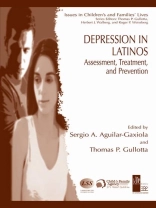Depression ranks as a leading mental health problem among Hispanic immigrants and their US-born children. And a wide array of issues – starting with the widespread stereotype of the “illegal immigrant” – makes the Latino experience of this condition differ from that of any other group. Depression in Latinos consolidates the conceptual, diagnostic, and clinical knowledge based on this salient topic, providing coverage from prevalence to prevention, from efficient screening to effective interventions.
In this concise yet comprehensive volume, leading clinicians, researchers, and academics offer extensive research and clinical findings, literature reviews (e.g., an in-depth chapter on the Mexican American Prevalence and Services Survey), and insights gathered from first-hand experience in clinical practice. Perceptive information is offered on the most urgent and complex issues on depression in this diverse and dynamic population, including: (1) The impact language, culture, and societal factors have on depression and its diagnosis. (2) The most relevant assessment instruments. (3) How depression manifests among Latino children, youth, and seniors as well as in Latinas. (4) The relationship between depression and substance abuse. (5) The most effective evidence-based treatment methods. (6) The efficacy of interventions for depression at the community level.
Depression in Latinos is vital reading for clinicians, counseling and school psychologists, psychiatrists, clinical social workers, and public health professionals interested in providing their Hispanic clients with the most effective treatment possible. In addition, its coverage of the broader issues of access to care makes this volume essential reading for mental health administrators, volunteer/outreach agencies, and policymakers.
Inhoudsopgave
Sociodemographic, Epidemiological, Linguistic, and Cultural Factors in Depression in Latinos.- The Context of Depression in Latinos in the United States.- Latino Population Demographics, Risk Factors, and Depression: A Case Study of the Mexican American Prevalence and Services Survey.- Descriptive Epidemiology of Depression in Latin America and Hispanics in the United States.- Comorbidity: Depression and Substance Abuse.- Cultural Considerations in the Diagnosis and Classification of Depression: The Hispanic Perspective.- Prevention, Screening, Assessment, and Diagnosis of Depression.- Prevention of Depression in Latinos.- Assessment of Depression Symptoms: Self-report Paper-and-Pencil and Computerized Questionnaires.- Diagnosis of Depression Among Latino Children and Adults.- Treatment of Depression.- Psychosocial Treatments for Depression with Adult Latinos.- Pharmacological Treatment of Depression in Hispanic Americans.- Community-Based Interventions for Depression.- Gender and Life-Cycle Issues.- Women and Depression: The Influence of Gender in Major Depressive Disorder.- Depression in Latino Children and Adolescents: Prevalence, Prevention, and Treatment.- Epidemiology, Assessment, and Treatment of Depression in Older Latinos.
Over de auteur
Sergio Aguilar-Gaxiola is Professor of Clinical Internal Medicine in the Department of Internal Medicine, School of Medicine, University of California, Davis. He is also Founding Director of the newly developed Center for Reducing Health Disparities at UC Davis Health System. Dr. Aguilar-Gaxiola is the on-site Principal Investigator of the Mexican American Prevalence and Services Survey (MAPSS), the largest mental health study conducted in the U.S. on Mexican Americans. He is a member of the National Advisory Mental Health Council (NAMHC), National Institute of Mental Health (NIMH). He holds several World Health Organization (WHO) advisory board and consulting positions, and is the Coordinator for Latin America and the Caribbean of the WHO World Mental Health (WMH) Consortium. He is also Chair Elect of the Board of Directors of the National Mental Health Association (NMHA) and a member of the NMHA’s Executive Board of Directors. He is actively involved in several key areas of national and international mental health. His extensive research includes cross-national comparative epidemiologic research on patterns and correlates of mental disorders and substance abuse in general population samples, and the development of culturally and linguistically sensitive mental health diagnostic instruments and the delivery of culturally and linguistically appropriate treatments. He is a licensed clinical-community psychologist who formally trained in cognitive-behavioral therapy for depressive and anxiety disorders with over two decades of experience providing psychotherapy services to Spanish-speaking consumers and their families.












